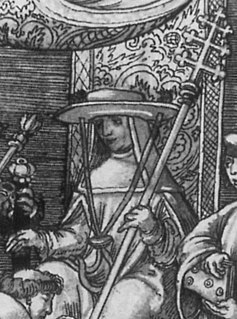Related Research Articles

Charles Margrave Taylor is a Canadian philosopher from Montreal, Quebec, and professor emeritus at McGill University best known for his contributions to political philosophy, the philosophy of social science, the history of philosophy, and intellectual history. His work has earned him the Kyoto Prize, the Templeton Prize, the Berggruen Prize for Philosophy, and the John W. Kluge Prize.
The close front unrounded vowel, or high front unrounded vowel, is a type of vowel sound that occurs in most spoken languages, represented in the International Phonetic Alphabet by the symbol i. It is similar to the vowel sound in the English word meet—and often called long-e in American English. Although in English this sound has additional length and is not normally pronounced as a pure vowel, some dialects have been reported to pronounce the phoneme as a pure sound. A pure sound is also heard in many other languages, such as French, in words like chic.

In music, modernism is an aesthetic stance underlying the period of change and development in musical language that occurred around the turn of the 20th century, a period of diverse reactions in challenging and reinterpreting older categories of music, innovations that led to new ways of organizing and approaching harmonic, melodic, sonic, and rhythmic aspects of music, and changes in aesthetic worldviews in close relation to the larger identifiable period of modernism in the arts of the time. The operative word most associated with it is "innovation". Its leading feature is a "linguistic plurality", which is to say that no one music genre ever assumed a dominant position.
Inherent within musical modernism is the conviction that music is not a static phenomenon defined by timeless truths and classical principles, but rather something which is intrinsically historical and developmental. While belief in musical progress or in the principle of innovation is not new or unique to modernism, such values are particularly important within modernist aesthetic stances.
Philip Repyngdon was a bishop and cardinal.
Victor IV was elected as a Ghibelline antipope in 1159, following the death of Pope Adrian IV and the election of Alexander III. His election was supported by the Emperor Frederick Barbarossa. He took the name Victor IV, not accounting for Antipope Victor IV of 1138, whose holding of the papal office was deemed illegitimate.

Chaplygin is a large lunar impact crater that lies on the far side of the Moon. It is located to the southeast of the huge walled plain Mendeleev, about midway between the craters Schliemann to the northeast and Marconi to the southwest. It is about the same size as Albategnius on the near side.
Sigeric was the Archbishop of Canterbury from 990 to 994.
Henry of Eppenstein was Duke of Carinthia and Margrave of Verona from 1090 to 1122. He was the last duke from the House of Eppenstein.
Æthelgar was Archbishop of Canterbury, and previously Bishop of Selsey.
Wulfhelm was Bishop of Wells before being promoted to the Archbishopric of Canterbury about 926. Nothing is known about his time at Wells, but as archbishop he helped codify royal law codes and gave lands to monasteries. He went to Rome soon after his selection as archbishop. Two religious books that he gave to his cathedral are still extant.
Jocelin of Wells was a medieval Bishop of Bath. He was the brother of Hugh de Wells, who became Bishop of Lincoln. Jocelin became a canon of Wells Cathedral before 1200, and was elected bishop in 1206. During King John of England's dispute with Pope Innocent III, Jocelin at first remained with the king, but after the excommunication of John in late 1209, Jocelin went into exile. He returned to England in 1213, and was mentioned in Magna Carta in 1215.

Adalbert II of Ballenstedt, an early member of the House of Ascania, was Graf (count) in Saxony and Vogt of Nienburg Abbey.
Cyneweard was an Anglo-Saxon Bishop of Wells. He was a monk of Glastonbury Abbey before becoming abbot of Milton Abbey in 964. He was consecrated bishop of the Diocese of Wells in about 973 or 974, and died in office on 28 June 975. His death is mentioned in the short Old English poem "The Death of King Edgar", which occurs in the entry for 975 of two of the manuscripts of the Anglo-Saxon Chronicle.
Sigar was an Anglo-Saxon Bishop of Wells.

The 1144 papal election followed the death of Pope Celestine II and resulted in the election of Pope Lucius II.

St. George's Abbey is a monastic complex in the village of Sankt Georgen am Längsee, Carinthia, Austria. It celebrated its 1,000th anniversary in 2003.

Conrad I [of Abenberg] was Archbishop of Salzburg, Austria, in the first half of the 12th century.
Herman I was bishop of Bamberg from 1065 until 1075. He was a royal chaplain of King Henry IV of Germany before his appointment to the bishopric. His favoritism towards monastic communities brought him into conflict with the canons of the Bamberg Cathedral.
Tedald was archbishop of Milan from 1075 to 1085.
References
- ↑ Robinson 2003, p. 100.
- ↑ Eldevik 2012, p. 223.